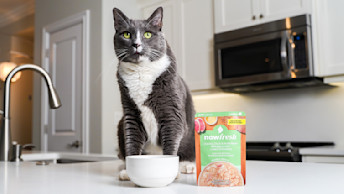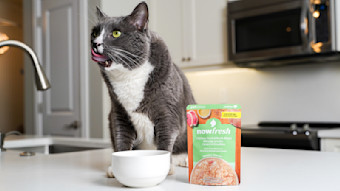September 25, 2025
Can Cats Have Chicken Broth?

Chicken broth is warm, comforting, and packed with flavour. But if you’re wondering, “Can cats have chicken broth?”, the answer is yes—with a few important caveats. Not all broths are created equal, and cats have unique dietary needs. Here’s what to know before you pour some into their dish.
Is Chicken Broth Safe for Cats?
Yes, chicken broth can be safe for cats. But it depends on what’s in it. Store-bought broths intended for human consumption often contain added salt, garlic, onions, and other ingredients that aren’t safe for cats. These extras can lead to health issues, even in small amounts.
If you're planning to offer your cat chicken broth, look for one that’s low in sodium and free from any added spices, seasonings, or artificial colours, flavours and preservatives. Or better yet, make your own at home so you can control exactly what goes into it.

Is Chicken Broth Good for Cats?
When made safely and offered in moderation, chicken broth can be good for cats. Here’s how:
Hydration: Cats are known to not drink enough water. Adding a bit of broth to their meals can encourage more fluid intake.
Gentle Nutrition: Bone-based broths can offer easily digestible sources of trace minerals and amino acids, especially if made at home using whole, clean ingredients. Nutrients found in bone broth can help to support immune health, skin and coat care, and good digestion
Palatability: For finicky eaters, a splash of warm broth over dry or wet food can make dinner more appealing.
That said, broth isn’t a cure-all. It won’t provide the complete nutrition your cat needs to thrive. Think of it as a supplement or occasional treat—not a daily staple.
Can Cats Have Beef or Bone Broth Instead?
While chicken broth is a popular option, beef and other bone broths can also be safe—as long as they follow the same guidelines: no added salt, no garlic or onions, and no artificial flavours, colours or preservatives.
If you’re looking to incorporate bone broth into your cat’s routine, look for broths made specifically for pets. If you’re making it yourself, stick to pet-safe ingredients and skim off the fat before serving to avoid the extra calories that can contribute to unwanted weight gain.
How to Serve Chicken Broth to Cats
A little goes a long way. Try one of these easy serving ideas:
Mix a spoonful into your cat’s wet food—or, find a complete and balanced wet food that already incorporates tasty broth.
Pour a small amount over dry kibble to soften it—or, find a bone broth coated kibble that can be mixed with water to create savory gravy.
Offer a few tablespoons of cooled broth in a dish as a treat.
Always let broth cool to room temperature before serving. Hot liquids can burn your cat’s mouth, and they might turn away if it’s too warm.
What About Chicken Stock or Gravy?
These aren’t the same. Chicken stock often includes bones, skin, and fat simmered with vegetables and seasonings—many of which can be harmful to cats. Gravy intended for humans usually contains thickeners, salt, and additives that don’t belong in a cat’s bowl.
Stick to simple, clean chicken broth or commercial wet food and kibble infused with broth if you’re looking for a safe, flavourful way to change things up at mealtime.
Final Thoughts
So, can cats eat chicken broth? Yes—as long as it’s plain, low-sodium, and free from harmful ingredients. It’s a great way to support hydration and make meals more appealing. Just remember, it’s a treat, not a main course. When in doubt, talk to your vet—especially if your cat has a health condition that requires a special diet.
With a little care, broth can be a tasty and comforting addition to your cat’s routine.


